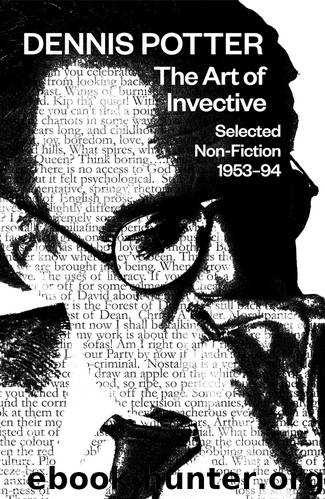The Art of Invective: Selected Non-Fiction 1953–1994 by Potter Dennis; Greaves Ian; Rolinson David

Author:Potter, Dennis; Greaves, Ian; Rolinson, David
Language: eng
Format: epub
Publisher: Oberon Books
Realism and non-naturalism278
Lecture delivered at Edinburgh International
Television Festival, 1 September 1977
In practical and rather derisive terms which suggest both its possibilities and its disabilities, the television set plugged in at the corner of the living room is just another convenient domestic appliance. The set plugged in at the corner of the lounge shows the same pictures to a different audience. In all cases, it is part of the humdrum litter of home life; a laminated, blank-eyed piece of electrical equipment, licensed like a dog, which supplies on every evening of the week, every week of the year, a constant stream of oblong images that merge together many apparently different categories of art, information and entertainment into what so often feels like the same sort of ‘experience.’
‘What’s on the telly tonight?’
‘Oh. Nothing very much.’
Switch on for one thing, though, and it’s very likely that you will be pulled into the stream. One programme trickles into another, quite painlessly. It takes something like the sight of, say, Humphrey Burton to make most of us switch off.279 If I did not take notes, I would have difficulty in remembering clearly enough what I had seen. Indeed, I sometimes think that so much time and skill is expended on programme titles on the screen for fear that the viewer who sees the twinkling set through an unflattering haze of habit, lulled expectation and domestic conversation will not otherwise be sufficiently aware that an insubstantial line of differentiation between one offering and another is about to be passed. There is such a complex exchange of mutual values between types of programme that it takes a sizeable shock to our expectations to make us blink twice at what we are seeing. Thus, the puzzling excitement apparently engendered by the spectacle of Angela Rippon dancing with Morecambe & Wise owes rather less to the length of her exposed thigh than to the oh-my-my of recognizing a properly bullet-eyed newsreader sandwiched in conventionally lascivious callisthenics between a pair of beloved comedians – though, in truth, the shock was duly tempered by the song that the three of them were murdering: “There May Be Trouble Ahead…”, the one tune almost everyone would choose as a matter of course if given the glum task of syncopating the standard BBC news bulletin. Much more interesting, to my eye, was that when the same newsreader appeared on Call My Bluff it was quite impossible for the opposing team to guess correctly when she was telling the truth and when she wasn’t. An acceptable cross-fertilization in both cases, however. But would we ‘see’ the news in the same way if Kenneth Kendall or Richard Baker were filmed holding banners on the Grunwick picket line? The ever-rolling stream has rather narrow banks after all.
Television drama – which in all its forms stretches all the way from a cigar called Hamlet to a play called Hamlet – has to take its place in the flow of pictures as a segment which tries to make especial
Download
This site does not store any files on its server. We only index and link to content provided by other sites. Please contact the content providers to delete copyright contents if any and email us, we'll remove relevant links or contents immediately.
Call Me by Your Name by André Aciman(19891)
Ready Player One by Cline Ernest(13974)
How to Be a Bawse: A Guide to Conquering Life by Lilly Singh(7153)
Wiseguy by Nicholas Pileggi(5310)
The Kite Runner by Khaled Hosseini(4948)
On Writing A Memoir of the Craft by Stephen King(4658)
Audition by Ryu Murakami(4610)
The Crown by Robert Lacey(4568)
Call me by your name by Andre Aciman(4463)
Gerald's Game by Stephen King(4369)
Harry Potter and the Cursed Child: The Journey by Harry Potter Theatrical Productions(4312)
Dialogue by Robert McKee(4156)
The Perils of Being Moderately Famous by Soha Ali Khan(4064)
Dynamic Alignment Through Imagery by Eric Franklin(3914)
Apollo 8 by Jeffrey Kluger(3511)
How to be Champion: My Autobiography by Sarah Millican(3493)
The Inner Game of Tennis by W. Timothy Gallwey(3471)
Seriously... I'm Kidding by Ellen DeGeneres(3411)
Darker by E L James(3404)
